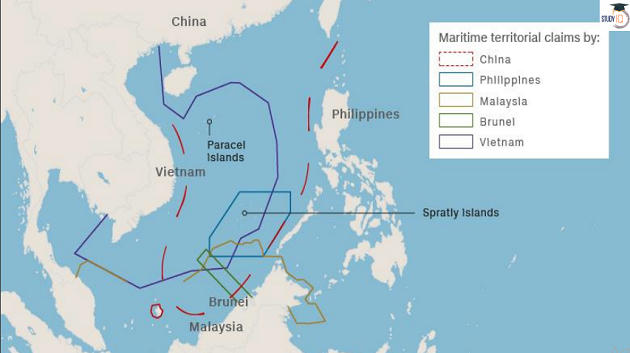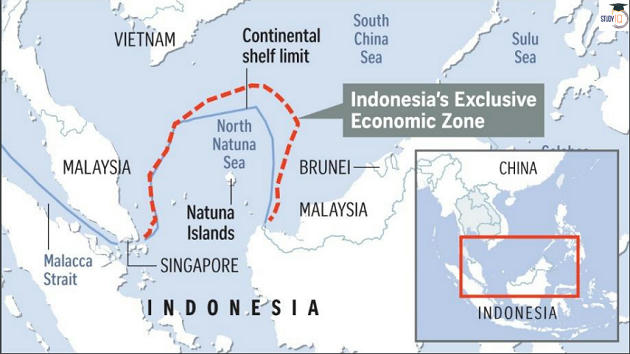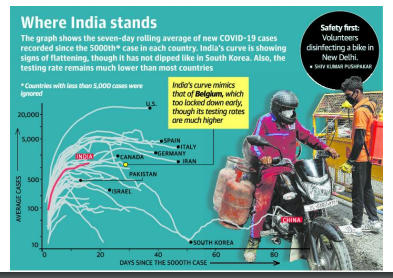Table of Contents
Fishing in troubled waters during a pandemic
- Beijing’s military moves in the contested South China Sea.
- China has conducted military drills and deployed large-scale military assets to the maritime area, while officially celebrating strides made in exploiting disputed energy resources in the sea.
- Vietnamese: a Chinese Coast Guard vessel “rammed and sunk” a Vietnamese fishing boat carrying eight Vietnamese fishermen in the Paracel Islands in the South China Sea.
- “Vietnam’s sovereignty over the Paracel Islands, causes property losses and endangers the lives, safety and legitimate interests of the Vietnamese fishermen”.

- It underlined that Chinese actions “also run counter to agreements reached by Hanoi and Beijing’s leaders and the proposed Code of Conduct that would govern all interested parties in the South China Sea dispute.”
- The Vietnamese government lodged a diplomatic protest with China’s embassy in Hanoi, requesting the Chinese side to investigate the incident, strictly discipline the officers aboard the Chinese vessel aforementioned, prevent the recurrence of similar actions, and make adequate compensation for the losses of the Vietnamese fishermen.
- There have been incidents involving Chinese fishing vessels and the Chinese Coast Guard with Indonesian fishing vessels in waters around the Natuna Sea as well.

- China’s illegal fishing near the Natuna Sea carries global consequences.
- Satellite images showing a Chinese military plane landing on Kagitingan Reef in the West Philippine Sea in late March.
- There are also reports that China recently opened a research station on Kagitingan and Zamora Reef, also in the West Philippine Sea, to gather data on the ecology, geology, and environment in the Spratlys.
- Philippines: “Such incidents undermine relations between Southeast Asian nations and Beijing.”
- American ties with Vietnam have been on an upward trajectory in recent times.
- Vietnam has been an ardent supporter of the U.S.’s freedom of navigation operations (FONOPS) carried out in the South China Sea.
- At present, Vietnam is the chair of the ASEAN and will be presiding over the discussions on the Code of Conduct which has been a work in progress for long.
- Vietnam has always been in favour of nonclaimant countries or external players having an active voice and calling out China for its growing assertiveness in these contested waters.
Protection for protectors
- Many healthcare workers have been subjected to abuse and violence in the line of duty.
- Most of the attacks have been on healthcare personnel sent to localities to collect samples from people.
- Some doctors returning home from duty have been prevented from entering their homes and, in some cases, even asked to vacate their premises.
- The dastardly act of a few people in Chennai who not only attacked healthcare workers but also prevented a decent burial of a neurosurgeon who died of COVID19 complications on April 19 shook the nation’s conscience.
- Ordinance: amended the Epidemic Diseases Act, 1897 to make acts of violence against medical personnel a cognisable and non-bailable offence and also provide compensation in case of injury or damage or loss to property is thus commendable.
Main reason: fear and ignorance
- Doctors, nurses and other healthcare workers who are forced to work long hours treating patients infected with the highly infectious virus, and even when protective gear in the form of gloves, face mask and personal protective equipment are scarce, need more empathy, compassion, unmitigated support and cooperation from the society.
The COVID-19 paradox in South Asia
- The oldest and largest democracies in the world are often compared.
- The first person tested positive for COVID-19 on January 21 in the United States and on January 30 in India.
- Roughly three months later, on April 20, the total number of infections was 7,23,605 in the U.S. and 17,265 in India, accounting for 31.2% and 0.75% of the world total, while the number of COVID-19 deaths was 34,203 in the U.S. and 543 in India, making up 21.7% and 0.33% of the world total.
- The share of the two countries in world population, by contrast, is about 4% and 18%, respectively.
- On April 20, South Asia, with a share of 23.4% in world population, accounted for 1.25% of infections and 0.5% of COVID-19 deaths in the world.
- One-third of the world’s poor live in South Asia, so absolute poverty is high and nutrition levels are low.
- Population density in the subcontinent is among the highest in the world.
- Public health systems and facilities are perhaps the worst in the world.
- Past experience of the Spanish influenza in 1918, when India accounted for 18-20 million of the estimated 50 million deaths in the world, or conventional thinking even now, would have led to the opposite conclusion.
Testing has been nowhere near enough.
- Lockdowns imposed by governments clearly made a difference.
- The impact of diseases can and does differ across countries, possibly attributable to differences in cultures, immunities, or even climates.
- It has been suggested that countries which have mandatory BCG vaccinations against tuberculosis are less susceptible to COVID-19 morbidity and mortality.
- On April 20, Spain had around 1,96,000 infections and 20,500 deaths, whereas the Portugal had 20,200 infections and 700 deaths.
- Is it only a coincidence that BCG vaccinations are mandatory in Portugal but not in Spain, or that the U.S. and Italy, both ravaged by COVID-19, never had universal BCG vaccination programmes?
- In South Asian countries, almost 90% of the workforce is made up of the self-employed, casual labour on daily wages, and informal workers without any social protection.
- Livelihoods are an imperative for preserving lives.
- The problem will not vanish after lockdowns are lifted.
- Economic growth will be zero or negative this year.
- Alas, absolute poverty will increase once again, while economic inequality will rise further.
Making doctors wash hands
- Ignaz Semmelweis: a Hungarian-born doctor came to Vienna in 1846 to work at the city’s General Hospital.
- Ignaz noticed that women delivered by doctors had three times higher mortality rate than women delivered by midwives.
- He spotted a link between the lack of hygiene of the doctors and the mortality rate of the mothers.
- After he initiated a mandatory hand-washing policy, the mortality rate for women delivered by doctors fell from 18% to about 1%.
- Despite such a brilliant outcome, the idea of hand washing was rejected by the medical community.
- Semmelweis’s practice earned widespread acceptance only two decades after his death, when Louis Pasteur, of pasteurisation fame, raised awareness of pathogens.
- From the 1850s to 2020, hand washing has been advocated as a simple way of reducing the risk of infection.
- A study amongst Indian doctors by researchers S. K. Ansari et al, found that only 49% of doctors and 56% of nurses washed their hands with soap between patients.
- Behavioural scientists piloted a low-cost experiment in rural schools in Bangladesh where nudges were used to guide hand washing with soap after toilet use.
- Hand-washing stations were built in visible and easy to reach locations, brightly coloured paths were painted from toilets to the hand-washing station, and footprints and handprints were painted on the path and at the hand-washing station.
- Hand washing with soap after using the toilet went up from 4% before these behavioural design nudges were created, to 74% six weeks after they were introduced. No other hygiene education was communicated.
NEWS
- Lockdown ensured growth of cases remained linear, says govt.
- India has managed to maintain a linear growth of COVID-19 cases over the one month period during its lockdown, the Union Health Ministry said on Thursday even as the country reported over 1,409 new COVID-19 cases, taking the total number of cases to 21,700 with 16,689 active ones.

- Clause allowing FIR against firms for COVID-19 cases goes
- The government withdrew on Thursday the clause allowing filing of an FIR against a company and its management if an employee tests positive for COVID-19, following concerns raised by India Inc.
- “There is no mention of sole responsibility fixed of owner/director on detection of COVID-19 positive case/s,” stated the reworked guidelines sent to business owners. “The policy has been revised and the FIR clause removed. All the confusions on this matter should end.”
- ‘Industries can’t be forced to pay’
- In a report on the Industrial Relations Code, 2019, the Parliamentary Committee on Labour recommended that “in case of natural calamities, payment of wages until the re-establish-ment of the industry may be unjustifiable”. Panel Chairman Bhartruhari Mahtab said the lockdown could be counted as such a calamity.
- Gujarat records 217 new cases and nine deaths
- With 217 new infections and nine deaths recorded on Thursday, Gujarat’s COVID-19 curve continues to rise in number of cases and fatalities. So far, 112 people had died and 2,624 cases detected in the State.
- Maharashtra records single-day high
- In a record single-day surge, Maharashtra reported a staggering 778 fresh COVID-19 cases on Thursday as the State’s cumulative tally exceeded the 6,000-case mark to 6,427, while 14 new deaths took the death toll to 283.
- Dharavi cases cross 200
- Bhopal surpasses Indore in case growth rate
- The rate of growth in the number of COVID-19 cases in Bhopal was seven times that of Indore in three days, as the count of cases in Madhya Pradesh climbed to 1,687 on Thursday.
- Jaishankar thanks Saudi, Omani Ministers
- India on Thursday thanked Saudi Arabia for looking after the expat Indian community as the world continued to struggle with the COVID-19 pandemic. External Affairs Minister S. Jaishankar spoke with his Saudi Arabia and Oman counterparts as the Gulf region began observing the holy month of Ramadan.
- “Appreciated the very warm conversation with His Highness Prince Faisal, Foreign Minister of Saudi Arabia. Thanked him for taking care of the Indian community there. Discussed our shared interests in ensuring health and food security. India will remain a reliable partner,” he said in a social media message after the conversation. It is understood that Delhi has also assured Riyadh that the pandemic will not affect India’s supply of high quality Basmati rice to the monarchy.
- EU divided over virus recovery plan
- Rich members against long-term pooling of debt with Mediterranean nations they accuse of profligacy
- 4.4. mn seek U.S. jobless aid
- Give WHO powers to send in inspectors: Australia PM
- Australia’s Prime Minister called on Thursday for the World Health Organization to be given powers similar to U.N.-backed weapons inspectors, allowing their experts to enter virus-stricken countries to help prevent future pandemics.
- $30 mn more for WHO: China
- China said on Thursday it would donate another $30 million to the World Health Organization (WHO), which is seeking more than $1 billion to fund its battle against the pandemic.
- ‘U.S. goals will not change on North Korea’
Question
- Locate Iberian Peninsula and give the names of the countries that are part of it.
Download Free PDF – Daily Hindu Editorial Analysis






















 WhatsApp
WhatsApp